Index relies entirely on the support of donors and readers to do its work.
Help us keep amplifying censored voices today.
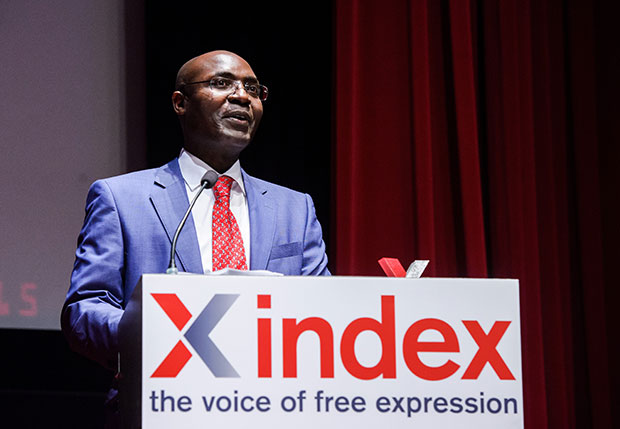
Journalist and human rights activist Rafael Marques de Morais (Photo: Alex Brenner for Index on Censorship)
The trial of Rafael Marques de Morais, the investigative journalists who has exposed corruption and serious human rights violations connected to the diamond trade in his native Angola, will restart on 14 May. He was initially set to appear in court again on 23 April, but was informed of the postponement late in the evening on 22 April.
Marques de Morais is being sued for libel by a group of generals in connection to his work. The parties will be negotiating ahead of 14 May, to try and find some “common ground”, Marques de Morais told Index.
“In the interest of all parties and for the benefit of continuing work on human rights and for the future of the country, it is a very important step to be in direct contact,” he said.
“Rafael’s crucial investigations into human rights abuses in Angola should not be impeded by this dialogue. Index stresses the importance of avoiding any form of coercion,” said Index on Censorship CEO Jodie Ginsberg.
Marques de Morais originally faced nine charges of defamation, but on his first court appearance on 23 March was handed down an additional 15 charges. The proceedings were marked by heavy police presence, and five people were arrested. This came just days after he was named joint winner of the 2015 Index Award for journalism.
The case is directly linked to Marques de Morais’ 2011 book Blood Diamonds: Torture and Corruption in Angola. In it, he recounted 500 cases of torture and 100 murders of villagers living near diamond mines, carried out by private security companies and military officials. He filed charges of crimes against humanity against seven generals, holding them morally responsible for atrocities committed. After his case was dropped by the prosecutions, the generals retaliated with a series of libel lawsuits in Angola and Portugal.
“Despite major differences, there is a willingness to talk that is far more important than sticking to individual positions. But this cannot impede work on human rights, freedom of the press and freedom of expression,” Marques de Morais added.
This article was posted on 23 April 2015 at indexoncensorship.org

Journalist and human rights activist Rafael Marques de Morais (Photo: Alex Brenner for Index on Censorship)
Just days after being named the joint winner of the journalism award at the 15th Index on Censorship Freedom of Expression Awards, Angolan journalist Rafael Marques de Morais appeared in court for exposing corruption and human rights abuses.
Marques was confronted with up to 15 additional charges when he arrived in court on 24 March. The case was later adjourned until 23 April.
I went to court today facing nine charges of criminal defamation. I left slapped with up to 15 additional ones for defamation. Speechless!
— Rafael Marques (@RafaelMdeMorais) March 24, 2015
He also tweeted that a number of protesters outside the courthouse had been arrested.
There were so many police officers in and out of the court house protecting me(?) and the generals, but they arrested five protesters too.
— Rafael Marques (@RafaelMdeMorais) March 24, 2015
Marques’ leading investigative work into corruption and human rights abuses at Angola’s diamond companies was distilled into his 2011 book Blood Diamonds: Torture and Corruption in Angola. He recounted 500 cases of torture and 100 murders of villagers living near diamond mines, carried out by private security companies and military officials.
Marques declared the bosses of these groups morally responsible for the atrocities committed under them, and filed charges of crimes against humanity against seven Angolan generals. After his case was dropped by the prosecution, the generals launched a series of retaliation lawsuits in Angola and Portugal, charging Marques with criminal libel.
The suit demands a total of £800,ooo from Marques. He could face up to nine years in prison.
Index on Censorship calls for Angolan authorities to drop all charges against Rafael Marques de Morais and respect press freedom.
Index Awards 2015
• Rafael Marques de Morais: I believe in the power of solidarity
• Safa Al Ahmad: Facts are a precious commodity in Saudi Arabia
• Amran Abdundi: This award is for the marginalised women of northern Kenya
• El Haqed: I will fight for freedom, equality and human rights for ever
• Tamas Bodoky: The independence of journalism in Hungary is under threat
• Special Index Freedom of Expression Award given to persecuted Azerbaijani activists and journalists
• Video: Comedian Shappi Khorsandi hosts Index on Censorship awards
• Drawing pressure: Cartoonists react to threats to free speech
This article was posted on 23 March 2015 at indexoncensorship.org
Rafael Marques de Morais is an Angolan journalist and human rights activist. He is currently facing nine charges of defamation after publishing on human rights abuses committed during diamond mining operations in Angola. Since 2008 he has run an anti-corruption watchdog news site called Maka Angola – “maka” means a serious, nuanced problem.
Marques has dedicated his career to investigating his country’s maka: ingrained corruption in Angolan government and industry, and the repeated violation of Angolans’ human rights. This culminated in his 1999 article The Lipstick of Dictatorship, which said Angolan President José Eduardo dos Santos was propagating the country’s civil war to distract attention from his regime’s “incompetence, embezzlement and corruption”.
In retaliation, Marques was arrested and detained for 40 days without charge, during which time he was denied food and water for days at a time. His six-month sentence for defamation of dos Santos was then suspended on condition that he wrote nothing critical of the government for five years. Within three years he was writing a series of reports documenting government-sponsored human rights abuses in Angolan province Cabinda.
Journalists in Angola are routinely threatened for speaking against the state – seven have been murdered since 1992, including a pro-opposition radio presenter who was shot in 2010. Rights activists are also targeted. In November 2014, a female student was beaten for two hours by a group of police officers for taking part in an anti-government demonstration.
In terms of its natural resources Angola is one of the world’s richest countries, with extensive deposits of oil and diamonds under its surface. The end of the country’s civil war in 2002 paved the way for enormous economic growth: in the subsequent decade the government budget grew from $6 billion to $69 billion, as oil and diamond sales rocketed.
But this financial influx hasn’t trickled down to the Angolan populace, 70 per cent of whom still live on less than $2 a day. Angola is ranked 161st out of 175 countries in Transparency International’s Corruption Perceptions Index. It’s easy to see why – between 2007 and 2010 $32 billion in oil revenue went unaccounted for in government ledgers.
Recently Marques has focused on following money trails between government figures and business leaders, especially in diamond and oil industries. A highlight of this work is his 2013 collaboration with Forbes magazine investigating the president’s daughter Isabel dos Santos, and the provenance of her $3.9 billion wealth. dos Santos, styled ‘Princess’ of Angola, is the richest woman in Africa – but Marques’ thorough investigations reveal the extent to which her father used his power to cut her into business deals.
Marques’ leading investigative work into corruption and human rights abuses at Angola’s diamond companies was distilled into his 2011 book Blood Diamonds: Torture and Corruption in Angola. He recounted 500 cases of torture and 100 murders of villagers living near diamond mines, carried out by private security companies and military officials.
Marques declared the bosses of these groups morally responsible for the atrocities committed under them, and filed charges of crimes against humanity against seven Angolan generals. After his case was dropped by the prosecution, the generals launched a series of retaliation lawsuits in Angola and Portugal, charging Marques with criminal libel. They are demanding a total of $1.6 million from Marques. The case will begin in March 2015.
In spite of the impending trial, last month Marques began publishing a series of pieces on land-grabbing generals who have displaced agrarian workers around Angola.
This article was posted on 19 February 2015 at indexoncensorship.org
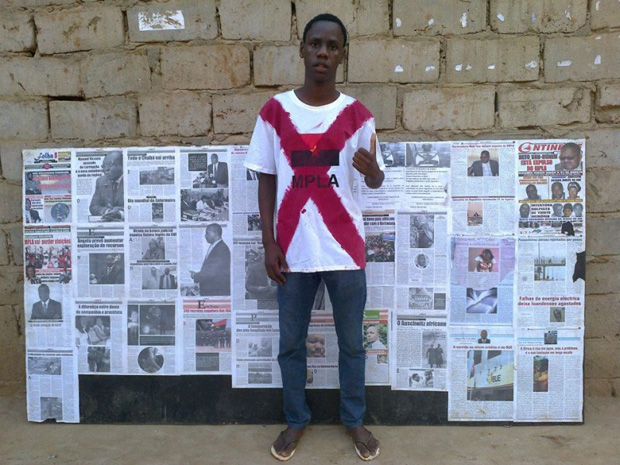
Manuel Chivonde Nito Alves was held in solitary confinement for printing t-shirts. Image from his Facebook page.
Angolan 17-year-old Manuel Chivonde Nito Alves went on hunger strike on Tuesday, following his arrest on 12 September for printing t-shirts with the slogan “Out Disgusting Dictator”. The message was aimed at the country’s President Jose Eduardo dos Santos, who has held power in since 1979. The shirts were to be worn at a demonstration in the capital Luanda, highlighting corruption, forced evictions, police violence and lack of social justice under dos Santos’ regime. Nito Alves has been charged with “insulting the president”, and has now spent almost two months in detention – parts of it in solitary confinement. His family were barred from seeing him, and three weeks went by before he was allowed to speak to a lawyer. The hunger strike is in protest at his “unjust and inhumane treatment”.
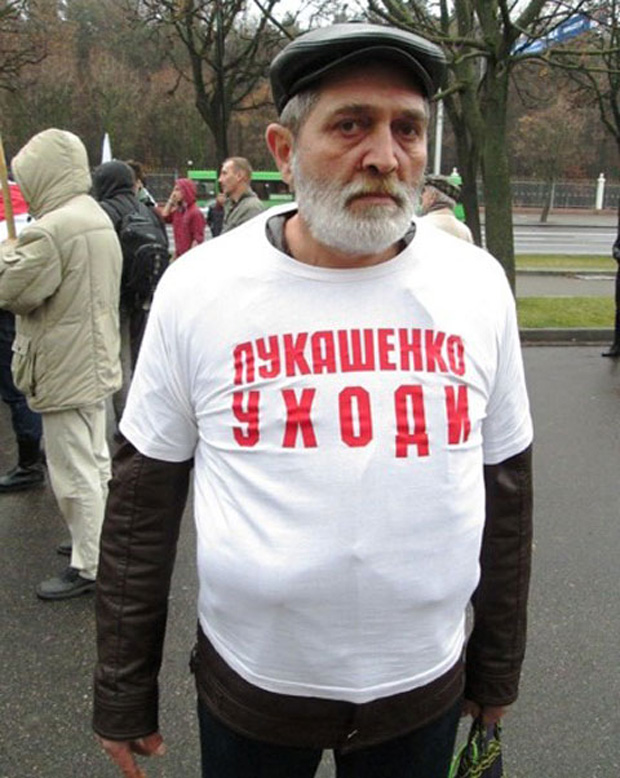
Yury Rubstow wearing the t-shirt that landed him in prison. (Image Viasna Human
Rights Centre)
On Monday, Belarusian opposition activist Yury Rubstow was sentenced to three days in jail for wearing a t-shirt with the slogan “Lukashenko, go away” on the front, and “A four-time president? No. This is not a president but an impostor tsar” on the back.” The message was aimed at the country’s dictator Alexander Lukashenko, during an opposition protest march. He was found guilty of disobedience to police officers under Article 23.4 of the Civil Offenses Code.
In 2010, Sipho Jele, a member of Swaziland’s People’s United Democratic Movement, was arrested for wearing a t-shirt supporting the party during a May Day parade. He was arrested under the country’s Suppression of Terrorism Act, and died in custody. The police said he had hanged himself, while the party say the police of killed him.
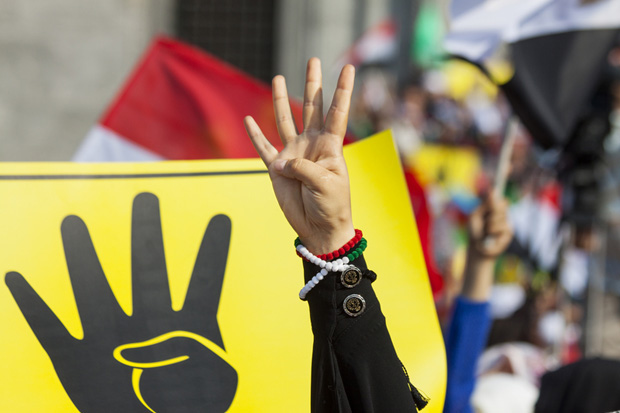
The Rabaa symbol displayed at a protest in Turkey (Image Bünyamin Salman/Demotix)
In September, three Egyptian men were arrested for wearing t-shirts emblazoned with the Rabaa symbol. A hand holding up four fingers, it is widely used by those opposing Egypt’s interim military-backed government, and the coup that ushered in in. Mohamed Youssef, the country’s kung fu champion, was also suspended by the national federation for wearing a similar t-shirt during a medal ceremony.
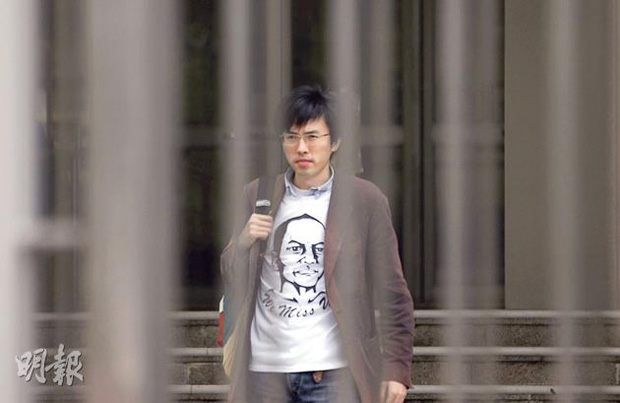
Avery Ng wearing the t-shirt he threw at Hu Jintao. Image from his Facebook page.
An activist from Hong Kong was arrested last December for throwing a t-shirt at former Chinese president Hu Jintao during an official visit almost six month earlier, on 1 July. League of Social Democrats Vice Chairman Avery Ng threw a t-shirt with a drawing of the late Chinese dissident Li Wangyang, a Tiananmen Square activist who died under suspicious circumstances only weeks before the visit. Ng was charged “with nuisance crimes committed in a public place”.
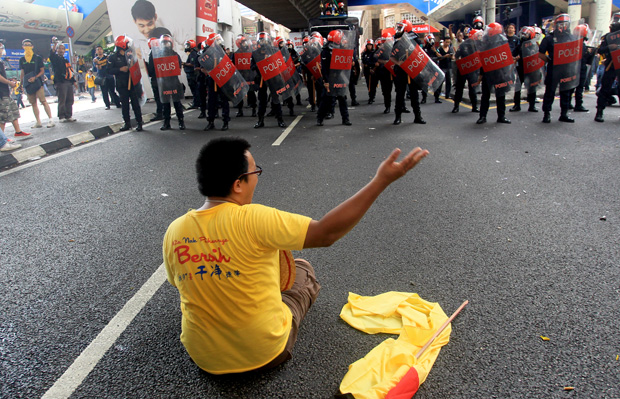
Malaysian protester wearing a Bersih shirt. (Image Syahrin Abdul Aziz/Demotix)
In June 2011, Malaysian police arrested 14 opposition activists for wearing t-shirts promoting a rally in Kuala Lumpur calling for election reform. The shirts carried the slogan “bersih” which means “clean”, and is the name of one of the groups behind the protest. Authorities claimed the demonstration was an “attempt to create chaos on the streets and undermine the government”, and they were therefore within their rights to arrest the protesters. They also confiscated t-shirts from the group’s headquarters.
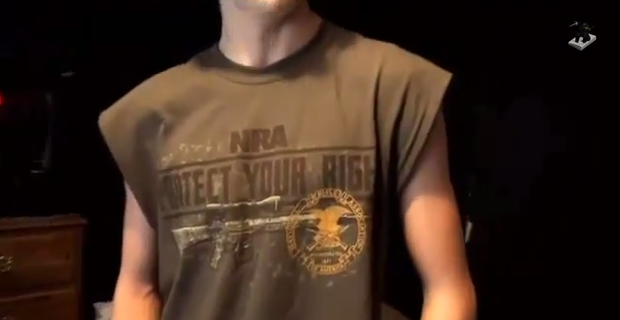
Jared Marcum wearing his NRA t-shirt in a TV report. (Image Youtube)
A 14-year-old student from West Virginia was in April suspended from school and subsequently arrested for refusing to remove a t-shirt supporting the pro-gun National Rifle Association. Jared Marcum was charged with “obstructing an officer” and faced a $500 fine and up to one year in prison.
On the flip side, a Tennessee man was arrested for wearing a t-shirt in support of stricter gun control laws. Stanley Bryce Myszka was wearing a shirt that read “Has your gun killed a kindergartener today?” at a shopping centre, following the shooting at Sandy Hook Elementary School. He was approached by security guards, who called the police when he when he refused to remove the shirt. He was also banned from the shopping centre for life.

The front of Barry Thew’s t-shirt. (Image Greater Manchester Police)
A Manchester man was in October 2012 sentenced to eight months in prison in part for wearing a t-shirt emblazoned with offensive comments referencing the murders of two policewomen. Barry Thew had written “One less pig; perfect justice” on the front of his t-shirt and “killacopforfun.com haha” on the back. While four months of the sentence was handed down for breach of a previous suspended sentence, he was charged on a Section 4A Public Order Offence for the t-shirt incident.